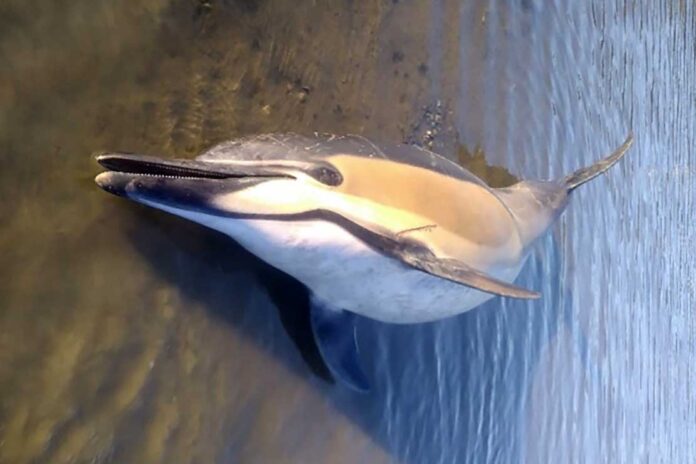Source: Massey University
Common dolphin that live stranded on a New Zealand beach. Photo Credit: Rebecca Boys.
New research reviewing the standard operating procedures (SOPs) for euthanasia of stranded cetaceans across Australasia has highlighted the need for more detailed guidance and consistency in end-of-life decisions and euthanasia procedures.
The Massey University-led study assessed the New Zealand SOP alongside state/territory SOPs across Australia, which are utilised to provide guidance to managers at stranding events. The review has reported variability in the criteria used to determine the need for an end-of-life decision and the procedures and equipment recommended to perform euthanasia.
The study, published in the international journal Marine Policy, also revealed a significant lack of welfare-relevant parameters were being collected at euthanasia events, such as assessing and recording time-to-death.
Lead author Rebecca Boys, a PhD student at Massey University’s Cetacean Ecology Research Group, says despite the importance of SOPs to ensure consistent and humane management practice, detailed, scientifically underpinned information is currently lacking.
“This can not only place field officers in complex situations but may also lead to prolonged suffering for stranded cetaceans,” she says.
“We need to ensure criteria informing end-of-life decision-making are objective, science-based and well-defined. Additionally, detailed information on the specific equipment and procedures required for end-of-life scenarios must be provided. This will ensure we are improving animal welfare outcomes for whales that cannot be returned to the sea.”
Ms Boys says very limited data on the welfare impacts of the procedures are actually recorded, including time taken until death. “The insufficient information hinders assessments of procedures and understanding of their welfare implications.”
Research Director for the Cetacean Ecology Research Group Professor Karen Stockin says the review was timely and needed to be considered in the appropriate context.
“New Zealand’s continued aim to save whales when they strand should not change. However, what does need attention is how we assess welfare during human intervention efforts, and that includes euthanasia itself. This is particularly important, so as to ensure consistent international best practice.”
Related articles
New research reveals emerging environmental contaminants of concern in NZ dolphins
New research reports a lack of information on euthanasia for stranded marine mammals
What’s for dinner? State of Hauraki Gulf reflected in dolphin diet
Created: 21/02/2022 | Last updated: 21/02/2022



